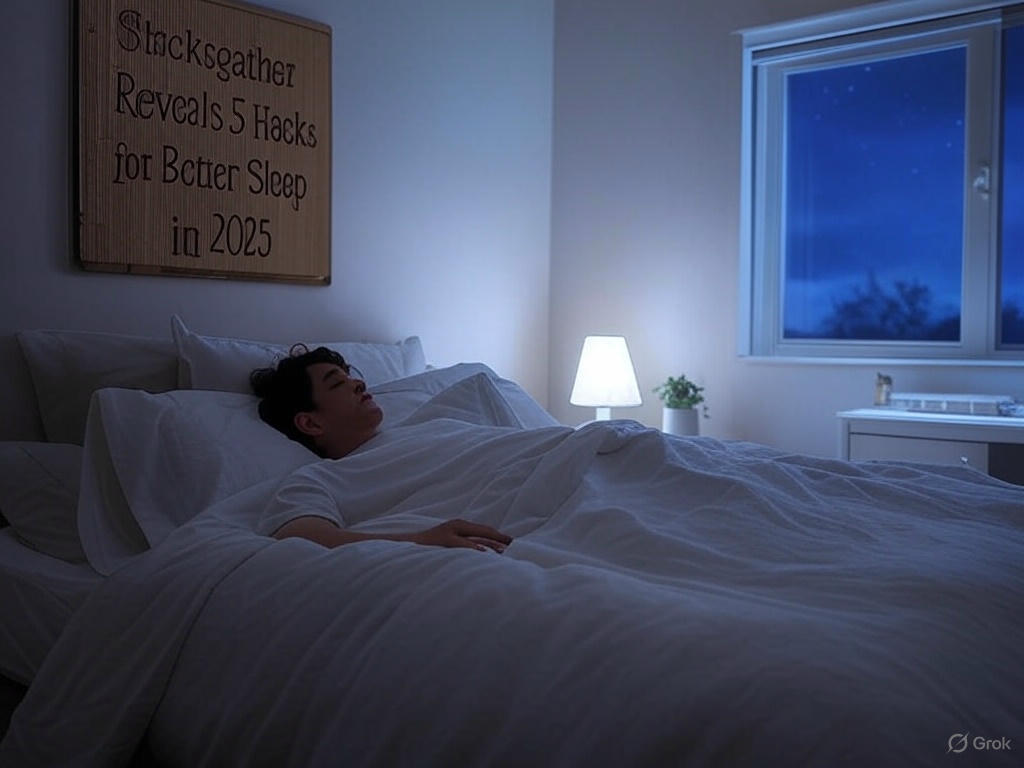Health and FitnessdifficultyFitnesshealth
Stacksgather Reveals 5 Hacks for Better Sleep
M
Muhammad Aamir Yameen
04-01-2025
21 mint mint read

In today’s fast-paced world, quality sleep often takes a backseat. Whether it’s stress, poor habits, or digital distractions, many struggle to achieve restful nights. Sleep is not just about resting; it’s about recovery, mental clarity, and overall well-being. Stacksgather brings you five scientifically-backed hacks to improve sleep quality, ensuring you wake up refreshed and ready to conquer the day.
1. Master the Art of Sleep Hygiene
Your bedtime routine and environment play a crucial role in sleep quality. Poor sleep hygiene disrupts your body’s natural rhythms, making restful nights elusive. Here’s how you can optimize your sleep environment:
- Maintain a Consistent Sleep Schedule – Going to bed and waking up at the same time daily regulates your circadian rhythm, making it easier to fall asleep and wake up refreshed.
- Declutter Your Bedroom – A messy, chaotic environment can elevate stress levels and interfere with sleep. Keep your sleeping space minimal and comfortable.
- Invest in High-Quality Bedding – A supportive mattress and breathable sheets can enhance comfort and reduce sleep disturbances.
- Regulate Light Exposure – Dimming the lights in the evening and avoiding blue light from screens at least an hour before bed helps signal to your body that it’s time to wind down.
2. Leverage Natural Sleep Aids
Instead of relying on sleep medications, try natural remedies that promote relaxation and enhance sleep quality.
- Magnesium-Rich Foods – Incorporating foods like bananas, almonds, and spinach can support muscle relaxation and improve sleep.
- Herbal Teas – Chamomile, valerian root, and lavender teas are known for their calming properties.
- Aromatherapy – Essential oils like lavender and eucalyptus can create a calming ambiance and ease anxiety before bedtime.
- Supplements like Melatonin – If necessary, consider melatonin supplements in consultation with a healthcare professional.
3. Implement Mindful Relaxation Techniques
A racing mind can be the biggest barrier to a restful night. Incorporating relaxation techniques can reduce stress and anxiety, leading to deeper sleep.
- Meditation & Breathing Exercises – Practices like guided meditation, deep breathing (4-7-8 technique), or progressive muscle relaxation help in calming the mind.
- Journaling Before Bed – Writing down worries or thoughts before bedtime clears mental clutter, making it easier to sleep peacefully.
- Gentle Yoga & Stretching – Light stretching or yoga poses can relieve muscle tension and prepare the body for rest.
4. Optimize Your Diet & Lifestyle
What you eat and how you live significantly impact your sleep patterns. Here are some lifestyle adjustments that promote better sleep:
- Limit Caffeine & Alcohol – Caffeine, especially in the evening, disrupts sleep. While alcohol may initially make you drowsy, it reduces sleep quality.
- Avoid Heavy Meals Before Bed – Eating large meals before sleeping can cause discomfort and indigestion, disrupting sleep.
- Stay Hydrated, But Not Excessively – Dehydration can cause discomfort, but excessive liquid intake may lead to frequent nighttime awakenings.
- Regular Physical Activity – Engaging in exercise earlier in the day can enhance sleep quality, but avoid intense workouts close to bedtime.
5. Leverage Sleep-Enhancing Technology
In an age of innovation, technology can also aid sleep rather than disrupt it. Try these tech-based solutions:
- White Noise Machines & Sleep Apps – These create a soothing background sound that masks disruptive noises.
- Smart Sleep Trackers – Devices like Fitbit or Oura Ring monitor sleep patterns and provide insights for improvement.
- Blue Light Blockers – Glasses or screen filters can reduce blue light exposure, making it easier to wind down.
- Smart Lights – These gradually dim at bedtime, simulating natural sunset effects that prepare your body for sleep.
Conclusion
A good night’s sleep is essential for productivity, mental clarity, and long-term health. By implementing these five hacks, you can transform your sleep habits and wake up feeling more energized. Small adjustments lead to significant improvements, and prioritizing sleep is one of the best investments you can make for your overall well-being.
For more expert-backed insights, visit Stacksgather.
References:
- National Sleep Foundation - https://www.sleepfoundation.org/
- American Academy of Sleep Medicine - https://aasm.org/
- Harvard Health - https://www.health.harvard.edu/
- Stacksgather - https://stacksgather.com/
M
Muhammad Aamir Yameen
Software Engineer